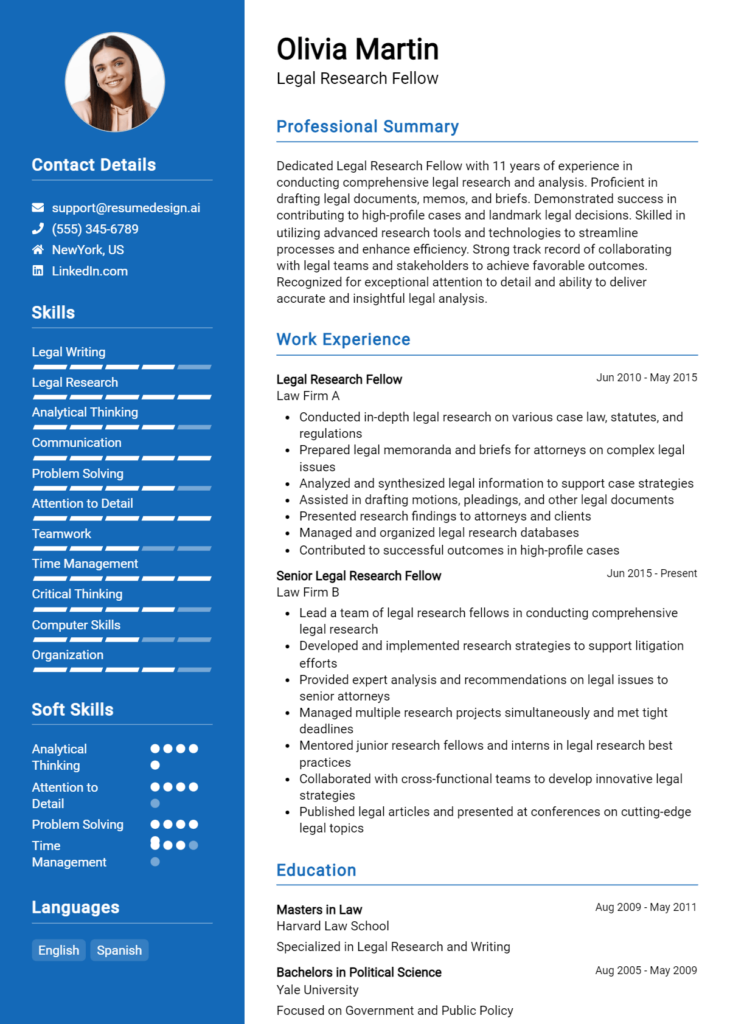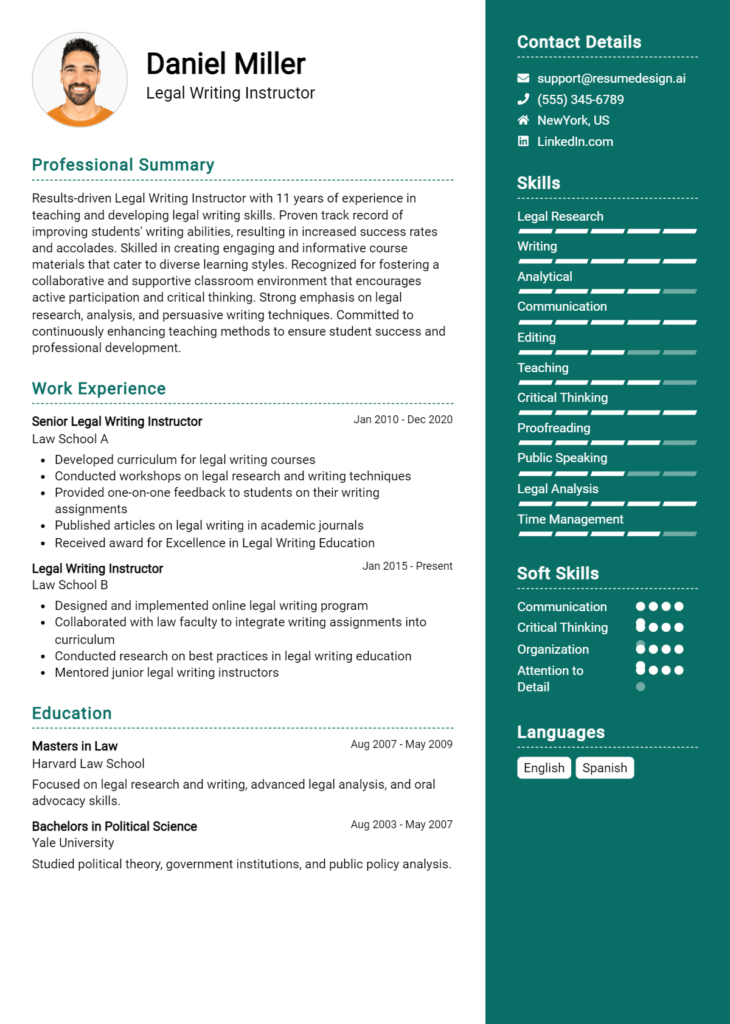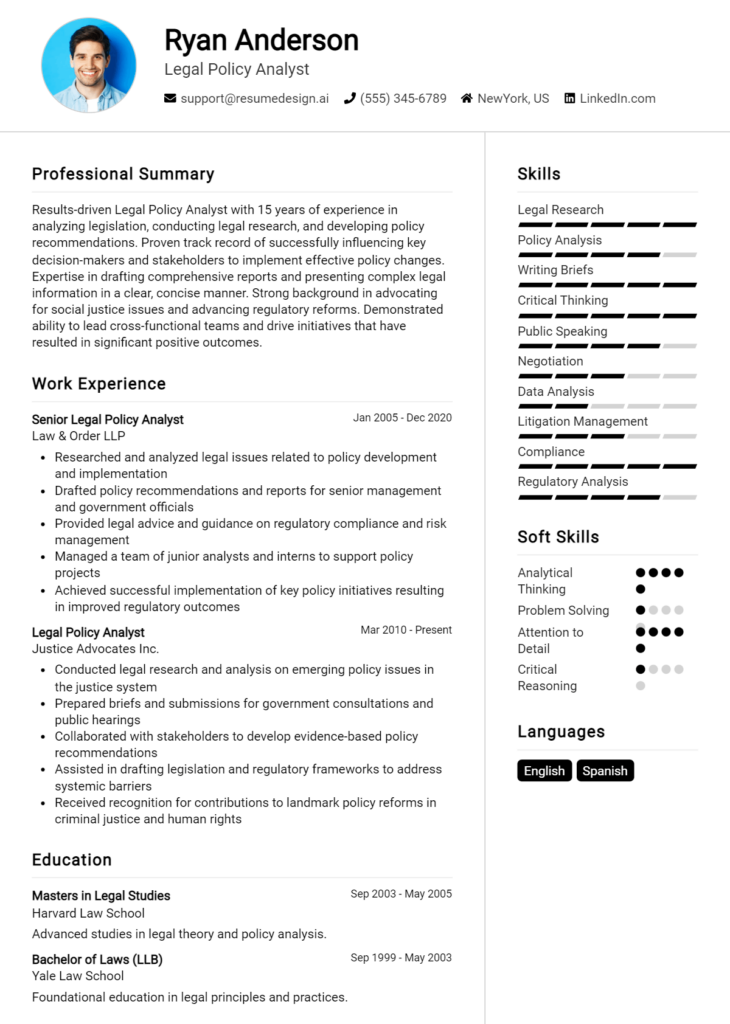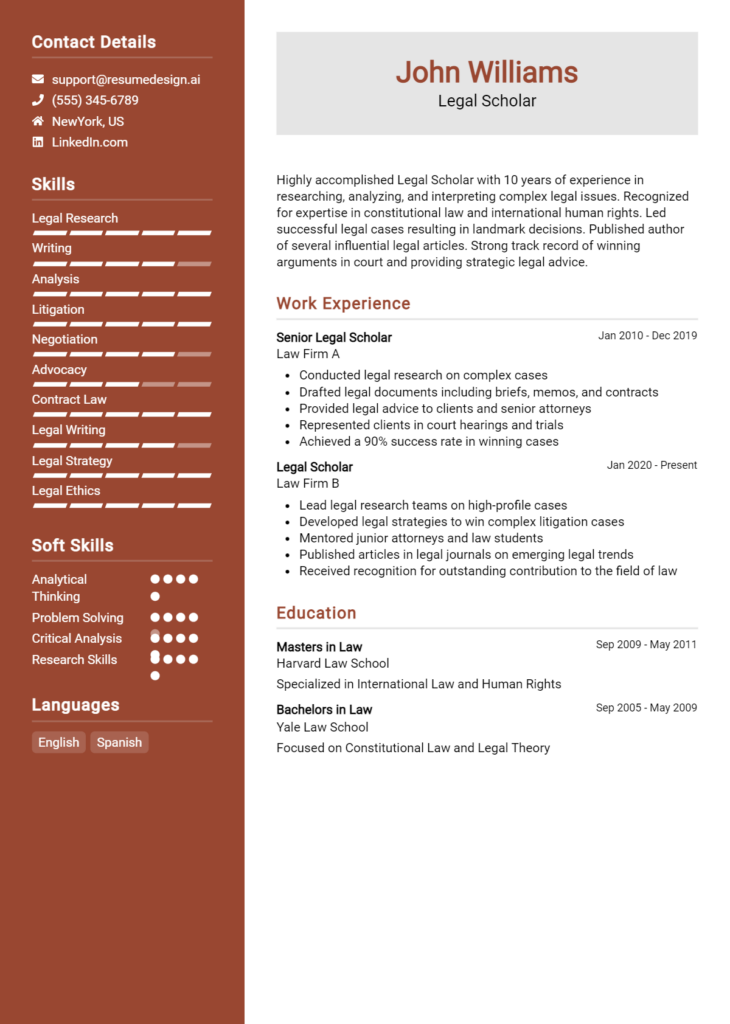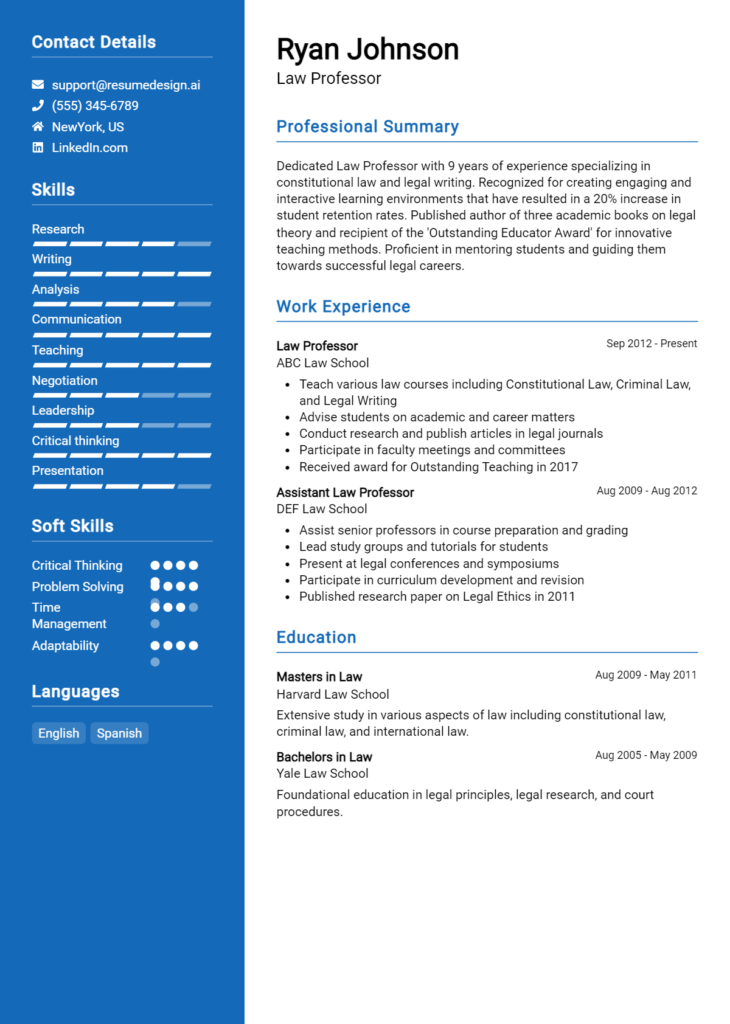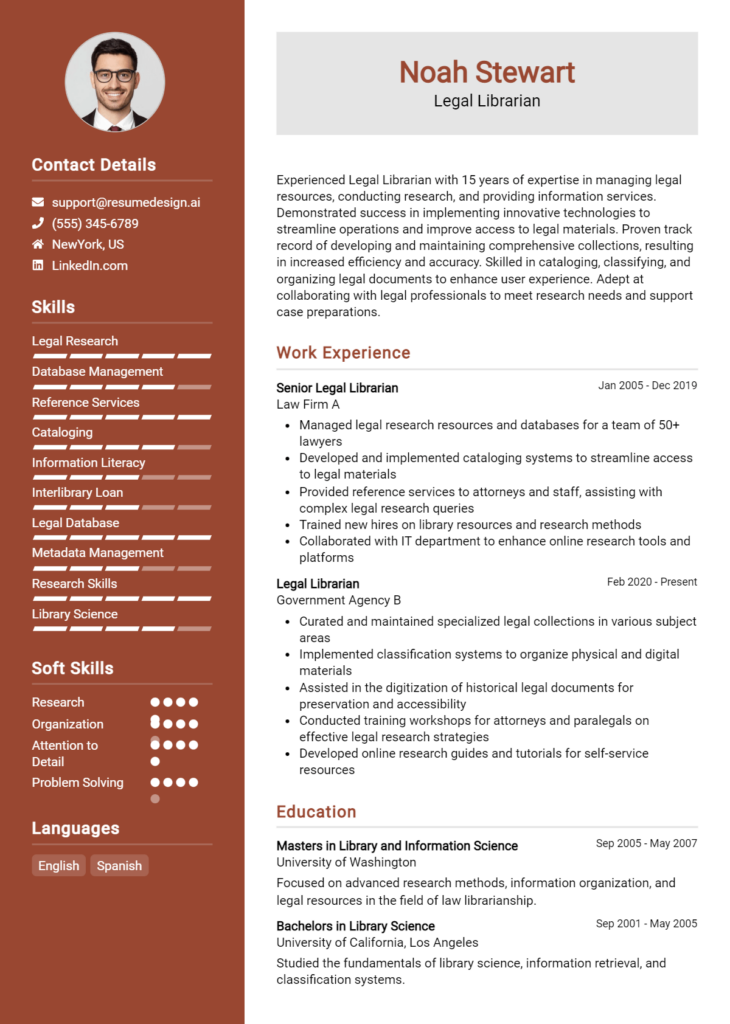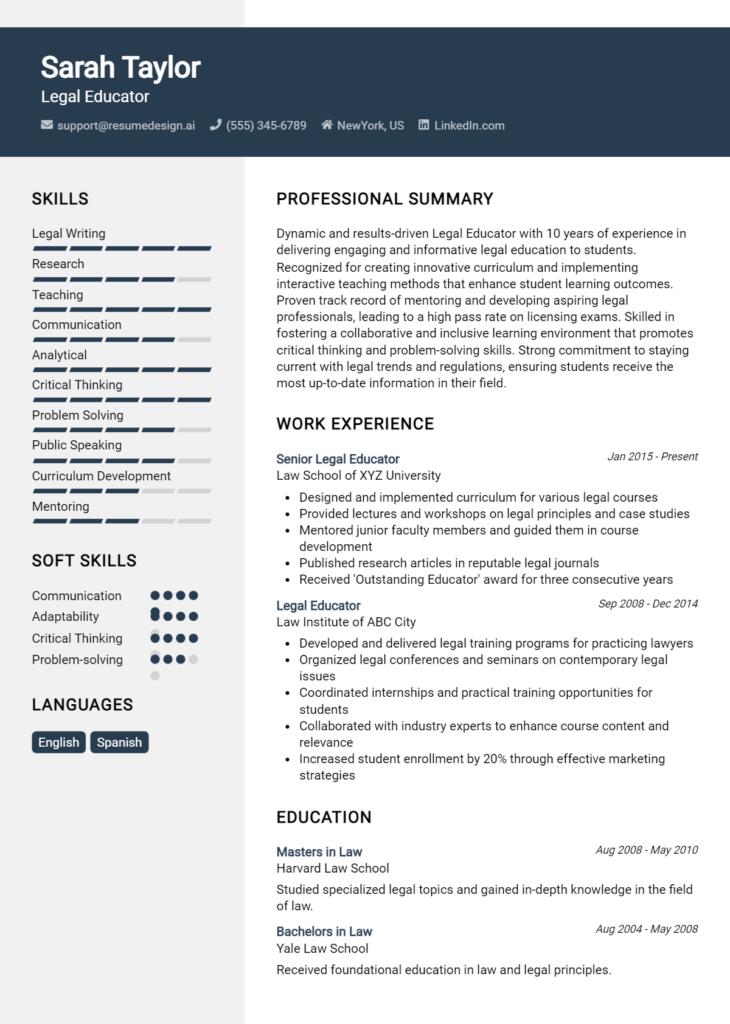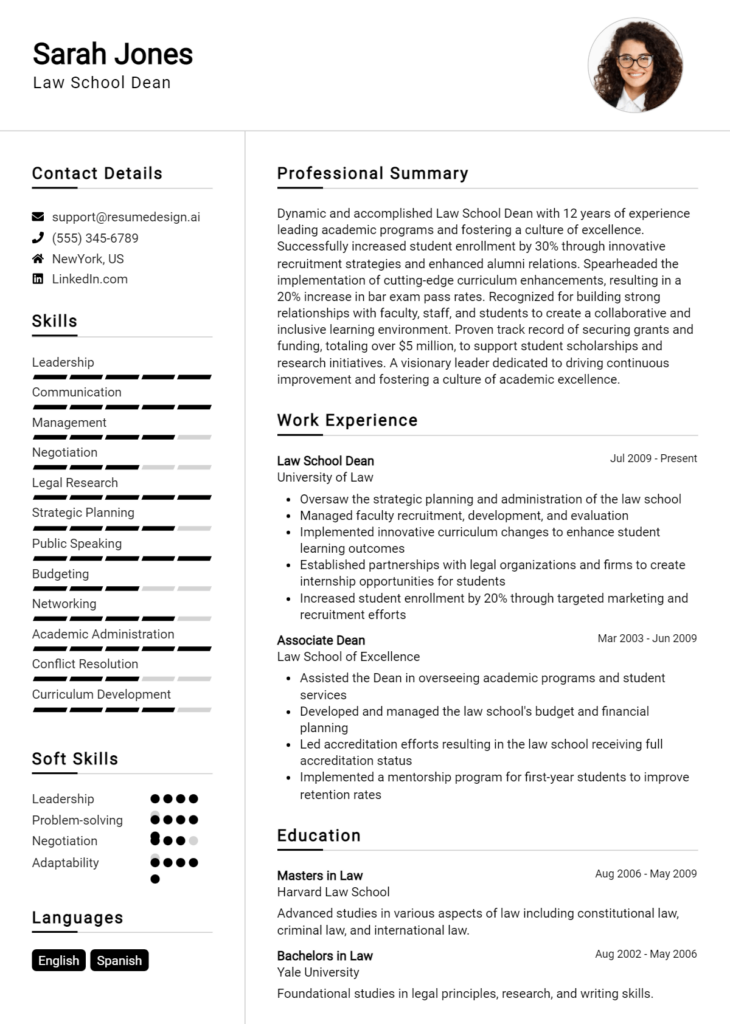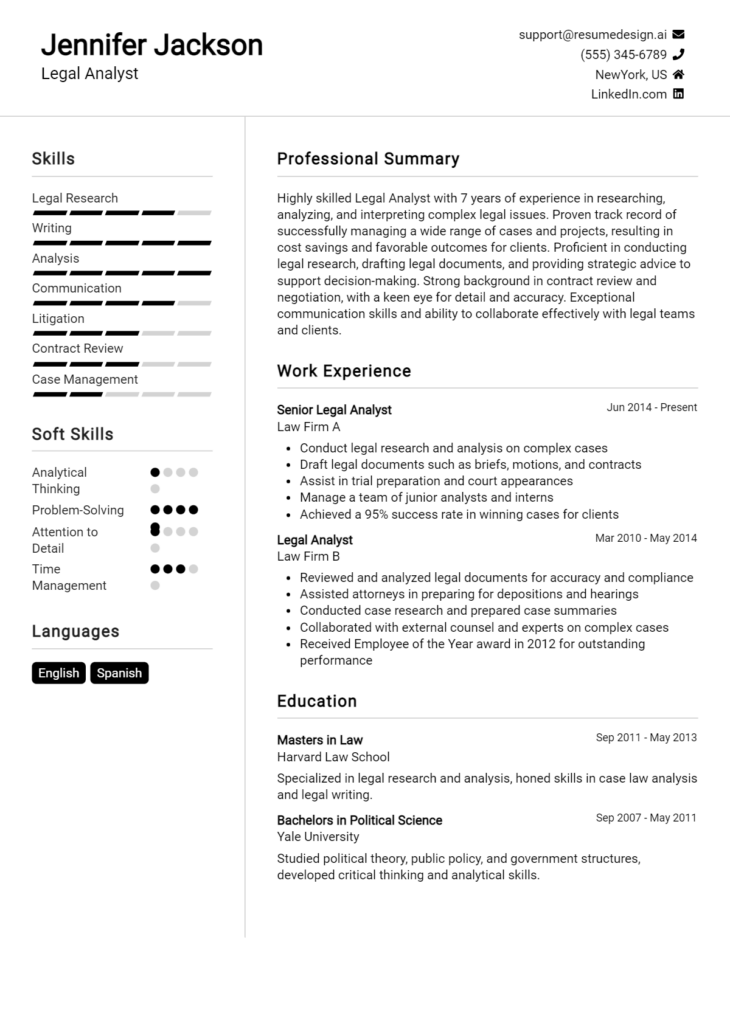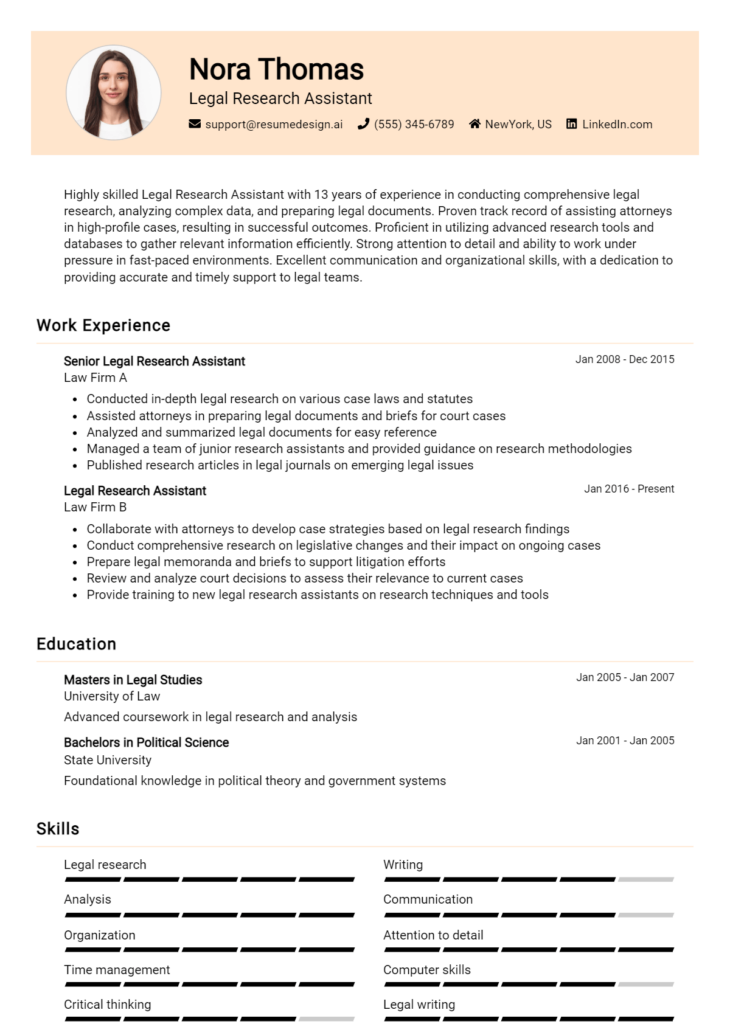Legal Researcher Core Responsibilities
A Legal Researcher plays a crucial role in bridging various departments by providing in-depth analysis and insights that inform legal strategy and operational decisions. Key responsibilities include conducting thorough legal research, reviewing case law, and drafting detailed reports. Essential skills encompass technical proficiency in legal databases, operational understanding of legal processes, and strong problem-solving abilities. These competencies not only support the organization’s objectives but also enhance the effectiveness of legal teams. A well-structured resume can effectively showcase these qualifications, demonstrating the candidate's value to potential employers.
Common Responsibilities Listed on Legal Researcher Resume
- Conduct comprehensive legal research using online databases and resources.
- Analyze statutes, regulations, and case law to provide legal insights.
- Prepare detailed reports and summaries for legal teams.
- Assist in drafting legal documents, briefs, and memoranda.
- Collaborate with attorneys to support case preparation.
- Monitor legislative changes and legal developments.
- Organize and maintain legal research databases.
- Provide training on research methodologies to junior staff.
- Evaluate legal issues and propose potential solutions.
- Ensure compliance with legal standards and practices.
- Assist in discovery processes and document review.
- Facilitate effective communication between legal and operational teams.
High-Level Resume Tips for Legal Researcher Professionals
In the competitive field of legal research, a well-crafted resume serves as a critical tool for professionals looking to make a strong first impression on potential employers. Your resume is often the initial representation of your skills, achievements, and suitability for the role, and it must effectively convey your expertise in a concise manner. A thoughtfully designed resume not only highlights your qualifications but also demonstrates your understanding of the legal landscape and the specific requirements of the position. This guide will provide practical and actionable resume tips specifically tailored for Legal Researcher professionals to help you stand out in the job market.
Top Resume Tips for Legal Researcher Professionals
- Tailor your resume to the job description by incorporating relevant keywords and phrases that align with the specific legal research role you are applying for.
- Highlight your experience in legal research methodologies, including case law analysis, statutory research, and regulatory compliance.
- Quantify your achievements by including metrics such as the number of cases researched, reports generated, or efficiency improvements made during your previous roles.
- Showcase your familiarity with legal research tools and databases, such as Westlaw, LexisNexis, or Bloomberg Law, to demonstrate your technical proficiency.
- Include relevant certifications or training, such as a paralegal certificate or specialized legal research courses, to enhance your credibility.
- Emphasize your analytical and critical thinking skills, providing examples of complex legal issues you have successfully navigated.
- Demonstrate your ability to synthesize information by outlining experiences where you compiled and presented comprehensive legal analyses.
- List any relevant internships or volunteer positions in legal settings, as they show your commitment to the field and provide practical experience.
- Write a compelling summary statement at the beginning of your resume that encapsulates your qualifications and sets the tone for the rest of the document.
- Ensure your resume is well-organized and free of errors, as attention to detail is crucial in the legal profession.
By implementing these tips, you can significantly enhance your chances of landing a job in the Legal Researcher field. A polished and targeted resume not only showcases your qualifications but also reflects your professionalism and readiness to contribute effectively to a legal team. Taking the time to craft a resume that aligns with industry standards will position you as a strong candidate in a competitive job market.
Why Resume Headlines & Titles are Important for Legal Researcher
In the competitive field of legal research, a well-crafted resume headline or title plays a crucial role in making an impactful first impression. A strong headline can immediately capture the attention of hiring managers by succinctly summarizing a candidate's key qualifications and areas of expertise in just a few words. It serves as a powerful introduction that highlights the candidate’s relevance to the job, allowing them to stand out among countless applications. When creating a resume headline, it is vital that it remains concise, relevant, and directly related to the specific position being applied for, as this will effectively communicate the candidate's value to potential employers.
Best Practices for Crafting Resume Headlines for Legal Researcher
- Keep it concise: Aim for a headline that is no longer than 10-12 words.
- Be specific: Use precise language that reflects the role and areas of expertise.
- Highlight key skills: Incorporate relevant skills that align with the job description.
- Include years of experience: If applicable, mention your experience level to showcase your qualifications.
- Use action-oriented language: Start with strong verbs to convey proactivity and confidence.
- Tailor to the job: Customize your headline for each application to match the employer's needs.
- Showcase accomplishments: If possible, include notable achievements to enhance credibility.
- Avoid clichés: Steer clear of overused phrases that can dilute the impact of your headline.
Example Resume Headlines for Legal Researcher
Strong Resume Headlines
"Detail-Oriented Legal Researcher with 5+ Years of Experience in Corporate Law"
“Proficient Legal Researcher Specializing in Intellectual Property and Litigation Support”
“Result-Driven Legal Research Analyst with Expertise in Regulatory Compliance”
Weak Resume Headlines
“Legal Researcher Looking for Opportunities”
“Experienced Professional Seeking a Job in Law”
The strong headlines are effective because they convey specific information about the candidate's experience, skills, and areas of specialization, making it easy for hiring managers to recognize their qualifications at a glance. In contrast, the weak headlines fail to impress due to their vagueness and lack of detail, leaving hiring managers unclear about the candidate's capabilities and relevance to the position. A compelling resume headline should not only grab attention but also provide a clear snapshot of what the candidate brings to the table.
Writing an Exceptional Legal Researcher Resume Summary
A resume summary is a crucial component of a Legal Researcher’s application, as it serves as the first impression for hiring managers. A well-crafted summary quickly captures attention by highlighting key skills, relevant experience, and notable accomplishments that align with the specific job role. It should be concise yet impactful, providing a snapshot of the candidate's qualifications and demonstrating how they can add value to the organization. Tailoring the summary to the job description ensures that it speaks directly to the needs of the employer, making it an essential tool for any aspiring Legal Researcher.
Best Practices for Writing a Legal Researcher Resume Summary
- Quantify achievements where possible to provide concrete evidence of your capabilities.
- Focus on key skills that are relevant to the role, such as analytical thinking, legal writing, and case analysis.
- Tailor the summary for the specific job description to align your qualifications with the employer's needs.
- Use industry-specific terminology to demonstrate familiarity with legal concepts and practices.
- Highlight relevant experience, including internships, academic research, or previous legal roles.
- Keep it concise, ideally between 2-4 sentences, to maintain the reader’s attention.
- Avoid jargon and overly complex language; clarity is key in communicating your qualifications.
- Showcase any specialized knowledge or certifications that could set you apart from other candidates.
Example Legal Researcher Resume Summaries
Strong Resume Summaries
Detail-oriented Legal Researcher with over 4 years of experience conducting extensive case law research and drafting legal memos. Successfully reduced research time by 30% through the implementation of advanced research tools.
Dedicated Legal Researcher with a track record of supporting litigation teams, enhancing case strategies by analyzing over 100 legal precedents. Proven ability to synthesize complex information into clear, actionable insights.
Results-driven Legal Researcher skilled in statutory interpretation and regulatory analysis, with a Master’s degree in Legal Studies. Recognized for contributing to a 20% increase in successful case outcomes through thorough research and collaboration.
Weak Resume Summaries
Legal Researcher with some experience in the legal field looking for a challenging position.
I have done research and written documents in the legal area. I am a hard worker.
The strong resume summaries are considered effective because they provide specific, quantifiable achievements and relevant skills that directly relate to the role of a Legal Researcher. They demonstrate the candidate's ability to deliver results and contribute to a team effectively. In contrast, the weak summaries lack detail and specificity, making them vague and unmemorable. They fail to convey the candidate's unique qualifications or how they can benefit the employer, which diminishes their impact in a competitive job market.
Work Experience Section for Legal Researcher Resume
The work experience section of a Legal Researcher resume is pivotal in demonstrating a candidate's competencies and contributions to the legal field. This section serves as a platform to showcase essential technical skills, such as proficiency in legal research databases, as well as the ability to manage projects and collaborate with legal teams to deliver high-quality results. By quantifying achievements—whether through successful case outcomes, research efficiency metrics, or team leadership accomplishments—candidates can align their experience with industry standards, making a compelling case for their suitability for the role.
Best Practices for Legal Researcher Work Experience
- Highlight specific legal research tools and databases you have mastered, such as Westlaw or LexisNexis.
- Quantify your achievements by including metrics, such as the percentage of successful case research outcomes or efficiency improvements.
- Demonstrate your ability to manage teams by detailing your leadership roles in collaborative projects.
- Use action verbs to convey your contributions effectively, such as "analyzed," "developed," and "collaborated."
- Focus on relevant experiences that align with the job description and industry expectations.
- Include any published research or presentations that showcase your expertise and thought leadership.
- Tailor your experiences to reflect the specific skills and qualifications sought by prospective employers.
- Provide context for your achievements, explaining the challenges faced and how you overcame them.
Example Work Experiences for Legal Researcher
Strong Experiences
- Conducted comprehensive legal research for a high-stakes case, resulting in a 30% reduction in litigation costs for the firm.
- Led a team of 5 researchers to develop a multi-faceted legal strategy that successfully defended against a $1 million lawsuit.
- Streamlined the legal research process by implementing a new database management system, improving research efficiency by 40%.
- Published a peer-reviewed article on legal trends that garnered over 500 citations, establishing expertise in the field.
Weak Experiences
- Assisted in legal research tasks as part of a team.
- Helped with preparing documents and other research-related activities.
- Involved in various legal projects without specific details on contributions.
- Performed legal research and analysis on several cases.
The examples provided illustrate why certain experiences are considered strong or weak. Strong experiences are defined by their specificity, quantifiable outcomes, and clear descriptions of leadership and collaboration, demonstrating a candidate's impact and expertise. In contrast, weak experiences lack detail, are vague, and do not convey measurable achievements, making it difficult for potential employers to assess the candidate's true capabilities.
Education and Certifications Section for Legal Researcher Resume
The education and certifications section of a Legal Researcher resume is crucial as it serves to showcase the candidate's academic background and professional qualifications. This section provides potential employers with a clear view of the applicant's formal training, specialized knowledge, and ongoing commitment to professional development. By including relevant coursework, industry-recognized certifications, and any specialized training, candidates can significantly enhance their credibility and demonstrate their alignment with the job role, which is essential in a competitive legal field.
Best Practices for Legal Researcher Education and Certifications
- Prioritize relevant degrees such as Juris Doctor (JD) or Bachelor of Arts in Legal Studies.
- Include industry-recognized certifications like Certified Legal Researcher (CLR) or Advanced Legal Research Certificate.
- Detail specific coursework that aligns with legal research skills, such as Advanced Legal Writing or Research Methodologies.
- Highlight any specialized training programs, workshops, or seminars attended that relate to legal research.
- Use clear and concise language to describe degrees and certifications, avoiding jargon.
- Order entries chronologically, starting with the most recent achievements to showcase continuous learning.
- Tailor the content to match the job description, emphasizing the most relevant qualifications.
- Consider adding honors or awards received during educational pursuits to enhance credibility.
Example Education and Certifications for Legal Researcher
Strong Examples
- Juris Doctor (JD), Harvard Law School, 2022
- Certified Legal Researcher (CLR), National Association of Legal Professionals, 2023
- Advanced Legal Research Certificate, American Bar Association, 2021
- Bachelor of Arts in Legal Studies, University of California, Berkeley, 2020
Weak Examples
- Associate Degree in Business Administration, Community College, 2015
- Certification in Microsoft Office, 2018
- High School Diploma, Local High School, 2010
- Online Course in Creative Writing, 2020
The strong examples listed above are considered effective because they directly relate to the skills and knowledge required for a Legal Researcher position, showcasing advanced degrees and industry-recognized certifications. In contrast, the weak examples fall short as they do not pertain to the legal field or the specific competencies needed for legal research roles, thereby failing to enhance the candidate's profile in the context of the job application.
Top Skills & Keywords for Legal Researcher Resume
As a Legal Researcher, possessing a diverse set of skills is crucial not only for the effectiveness of your work but also for making a strong impression through your resume. Employers in the legal field seek candidates who can demonstrate both analytical capabilities and interpersonal finesse. The right combination of skills can highlight your ability to conduct thorough research, analyze complex legal issues, and communicate findings effectively. In a competitive job market, showcasing these skills can set you apart from other candidates and emphasize your readiness to contribute to a legal team.
Top Hard & Soft Skills for Legal Researcher
Soft Skills
- Critical Thinking
- Attention to Detail
- Communication Skills
- Time Management
- Problem-Solving
- Adaptability
- Team Collaboration
- Research Proficiency
- Ethical Judgment
- Interpersonal Skills
Hard Skills
- Legal Research Techniques
- Knowledge of Legal Software (e.g., Westlaw, LexisNexis)
- Case Law Analysis
- Statutory Interpretation
- Document Drafting
- Familiarity with Legal Terminology
- Data Analysis
- Proficiency in Microsoft Office Suite
- Understanding of Legal Procedures
- Citation Management
Enhancing your resume with the right skills and relevant work experience is essential for landing a position as a Legal Researcher. By integrating both soft and hard skills effectively, you can present a comprehensive profile that appeals to potential employers.
Stand Out with a Winning Legal Researcher Cover Letter
Dear [Hiring Manager's Name],
I am writing to express my interest in the Legal Researcher position at [Company Name] as advertised on [where you found the job listing]. With a strong academic background in law combined with extensive experience in legal research and analysis, I am confident in my ability to contribute effectively to your team. My attention to detail, analytical skills, and ability to synthesize complex information make me a suitable candidate for this role.
During my time at [Previous Company or Institution], I honed my research capabilities by conducting comprehensive legal research on various topics, including statutory interpretation and case law analysis. I utilized numerous databases such as Westlaw and LexisNexis, ensuring that I remained up-to-date with the latest legal developments. My findings were instrumental in supporting the legal team in preparing briefs and memoranda, ultimately aiding in successful case outcomes. Additionally, my ability to communicate complex legal concepts in a clear and concise manner has been praised by colleagues and supervisors alike.
I am particularly drawn to the opportunity at [Company Name] because of your commitment to [specific value or mission of the company]. I am eager to bring my skills in legal research and my passion for the law to your esteemed organization. I believe that my proactive approach and dedication to excellence will make a meaningful impact on your legal team. I look forward to the possibility of discussing how my background and skills align with the goals of [Company Name].
Thank you for considering my application. I hope to speak with you soon to further discuss how I can contribute to your team as a Legal Researcher. Please find my resume attached for your review.
Sincerely,
[Your Name]
[Your Contact Information]
Common Mistakes to Avoid in a Legal Researcher Resume
When crafting a resume for a Legal Researcher position, it's crucial to present your qualifications and experience clearly and effectively. However, many candidates make common mistakes that can detract from their chances of landing an interview. By avoiding these pitfalls, you can create a compelling resume that highlights your skills and expertise in legal research. Here are some of the most common mistakes to watch out for:
Lack of Specificity: Vague statements about your skills or accomplishments can make your resume blend in with others. Always quantify your achievements and specify the legal areas you have researched.
Ignoring Keywords: Failing to incorporate relevant keywords from the job description can prevent your resume from passing through Applicant Tracking Systems (ATS). Tailor your resume to include terms that reflect the skills and experience the employer is seeking.
Overly Complex Language: Using complicated legal jargon or convoluted sentences can confuse readers. Aim for clarity and conciseness to ensure your qualifications are easily understood.
Omitting Relevant Experience: Sometimes candidates neglect to include internships or volunteer work that demonstrate their research skills. Include all relevant experiences, even if they were unpaid, to showcase your background.
Neglecting Formatting: Poor formatting can make your resume difficult to read. Use clear headings, consistent fonts, and bullet points to make your document visually appealing and easy to navigate.
Failure to Highlight Technology Proficiency: In today’s legal landscape, being proficient in research tools and legal databases is essential. Make sure to list any software or tools you are familiar with, like Westlaw or LexisNexis.
Writing an Objective Statement Instead of a Summary: Objective statements are often outdated and less impactful. Instead, use a professional summary to highlight your skills and experiences that are directly relevant to the role.
Not Tailoring Each Application: Sending out a generic resume can be detrimental. Customize your resume for each job application to reflect the specific qualifications and experiences that make you a great fit for that particular role.
Conclusion
As a Legal Researcher, you play a crucial role in the legal system by conducting thorough research, analyzing case law, statutes, and legal precedents to support attorneys and clients. Throughout this article, we discussed the essential skills required for excelling in this position, including strong analytical abilities, attention to detail, and proficiency in legal research tools and databases. We also highlighted the importance of effective communication skills, as presenting complex legal concepts in a clear manner is vital.
In conclusion, ensuring that your resume reflects your qualifications and experiences as a Legal Researcher is paramount for standing out in a competitive job market. We encourage you to take a moment to review and update your resume to showcase your expertise and skills effectively.
To assist you in this process, consider utilizing various resources available to enhance your resume. Explore our collection of resume templates to find a layout that suits your style. You can also take advantage of our intuitive resume builder to create a professional document quickly. For inspiration, browse through resume examples that highlight successful Legal Researchers. Finally, don't forget to check out our cover letter templates to complement your resume and make a lasting impression on potential employers.
Take action today and refine your resume to better reflect your qualifications as a Legal Researcher!

